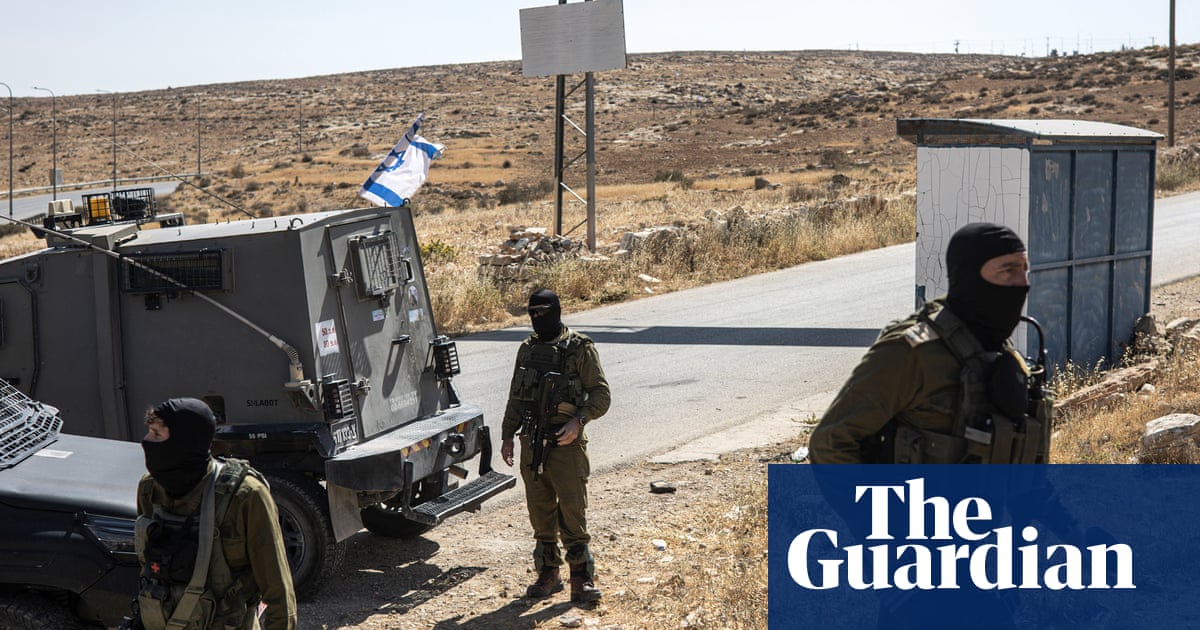Masked Israeli soldiers have blocked an international group of reporters from visiting Palestinian villages on the West Bank that have been under sustained attack by Jewish settlers, and which were the subject of anOscar-winning documentary film.
TheAcademy Award won by No Other Landhas not stopped the attacks on Masafer Yatta, a cluster of villages on the southern edge of the occupied territory, which has been the target of settler violence and house demolitions and forced displacement by the army for many years.
After soldiers almost complete destroyed one of the hamlets in the area, Khalet Al-Daba’a, in early May, two of the film’s co-directors, Yuval Avraham and Basel Adra, invited journalists to visit the area, which is Adra’s home, to witness the extent of the destruction first hand.
“It’s not easy for me to write this, but my community Masafer Yatta will be destroyed unless more activists and journalists don’t urgently come and join us on the ground,” Adra wrote on X. “Settlers are now in [Khalet Al-Daba’a] village 24/7 after the army destroyed it.”
The convoy of 20 reporters in press vehicles was stopped on the way to Masafer Yatta on Monday by Israel Defense Forces (IDF) soldiers wearing black balaclava-type masks hiding most of their faces. In a video taken at the scene andposted by Avraham, an IDF major gives the journalists “a reasonable time of 10 minutes” to leave.
The two film-makers can be seen remonstrating with the officer, pointing out that Adra had invited the journalists to his own home. “They are coming to see the destruction in Masafer Yatta, the way that you are destroying the community, the settler violence,” Avraham says.
The major responds by saying that the journalists were being prevented from visiting “to keep order in this area”, claiming they were causing a “public disturbance”.
Adra replies: “You didn’t prevent the settlers when they came to burn the homes inside, the cars, and attack people. I have so many videos of settlers coming to attack us and shoot people here. You do nothing. Why? Why now, only when journalists are coming to see this and to film this and to interview people, [are] you coming to prevent them?”
He later wrote on X: “This is what it means to live under occupation: a masked soldier decides who and when can pass, when to destroy or to invade our homes.”
The IDF was asked for comment on Monday’s incident but did not provide one.
TheInternational Solidarity Movement, a group set up to resist land seizures on occupied Palestinian territory, has said that two of its activists were detained in Khalet Al-Daba’a on Saturday, and that one of them, a 48-year-old Swedish resident of London, Susanne Björk, was deported.
No Other Land, made by a Palestinian-Israeli collective, won the Oscar on 2 March as the year’s best documentary feature. Three weeks later, another of its co-directors, Hamdan Ballal, wasattacked at his homein Masafer Yatta by a group of settlers and then detained by the IDF.
Backed by the hardline coalition of the Israeli prime minister, Benjamin Netanyahu, settlers have accelerated their seizure of Palestinian land and villages since the start of the Gaza war in October 2023.
The government announced last week that it wouldestablish 22 new settlementsin the occupied territory, legalising a series of outposts initially established without official authorisation.
The defence minister, Israel Katz, said the creation of the new settlements was “a strategic move that prevents the establishment of a Palestinian state that would endanger Israel”.
